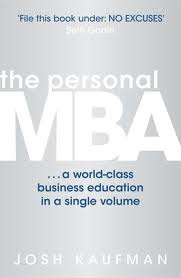
This is an unusual entry for this blog. It is, according to the author, a distillation of the most important ideas to be learnt in an MBA.
The author clearly has a pretty big chip on his shoulder about MBA programmes, and in particular about their price. He froths at the mouth for some time in the introduction about how much debt you go into to attend one, and how little you learn. I suspect he may be right about this, though it seems pretty obvious to me that most people do not go to business school to learn about business so much as to make contacts and to have a prestigious institution’s name on their CV. And these are very valuable assets, probably much more important than actually knowing what you are doing.
So this book focuses on the secondary goal, which is actually learning about business. I found it a very good basic introduction to the main concepts in business: profits, costs, overheads, etc. It is very clearly aimed at those starting a small business, and has many excellent recommendations, including explaining how to predict when a business will begin to make a return on investment, and how to start from the most basic beginnings.
Fittingly, for a book about reading, I also learn how to appropriately commodify books and magazines. Apparently, while there are many value forms (production, leasing, etc), reading matter may be classified as ‘audience aggregators,’ that have value primarily because the attention of the audience you gain can be sold on at a profit. Take that, Proust, Shakespeare, et al!
It really makes you think. For example, it made me think: if only Herman Melville had had a copy of PERSONAL MBA while he was dying in poverty! How different the history of nineteenth century American letters!

Heh interesting way to value books. I suppose it is one way to do it but I find it hard really to put any value to literature. Beyond the attention they are given what about the impact of the material?? Sounds like an interesting book. I don't have an MBA but I do have a BBA and I suppose the author would have similar views on them 🙂
Quite. I probably am not quite fair to him, as he did have lots of complex and interesting ideas, but I did love that description reading matter – as everything can be reduced to the quantifiable.
Interesting book, Sarah! I liked what you said about B-Schools – that people don't necessarily go there to learn, but to network and to get a good stamp on their resume. I also think that B-Schools set their fees based on the the kinds of salaries that students get after graduation, rather than the cost incurred by the institute for the course, and that might be another reason for the high fees. I also enjoyed reading your thoughts about how the book talks about commodifying literature and putting a value to it. I am not sure about quantifying the value of literature, but the idea is quite interesting.